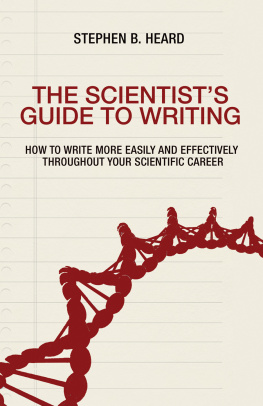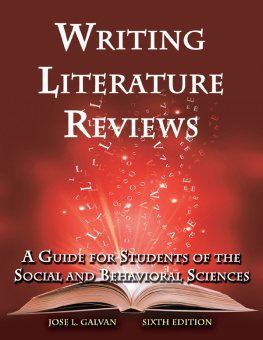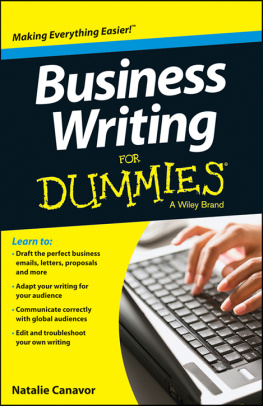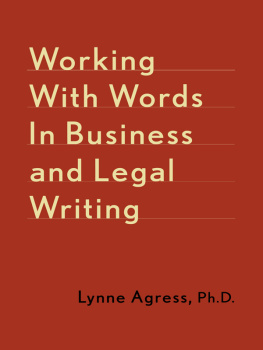
THE SCIENTISTS GUIDE TO WRITING
THE SCIENTISTS GUIDE TO WRITING
HOW TO WRITE MORE EASILY AND EFFECTIVELY THROUGHOUT YOUR SCIENTIFIC CAREER

STEPHEN B. HEARD
PRINCETON UNIVERSITY PRESS
PRINCETON AND OXFORD
Copyright 2016 by Princeton University Press
Published by Princeton University Press, 41 William Street, Princeton, New Jersey 08540
In the United Kingdom: Princeton University Press, 6 Oxford Street, Woodstock, Oxfordshire OX20 1TW
press.princeton.edu
Jacket image courtesy of Shutterstock
All Rights Reserved
ISBN 978-0-691-17021-3
ISBN (pbk.) 978-0-691-17022-0
Library of Congress Control Number: 2015950552
British Library Cataloging-in-Publication Data is available
An earlier version of has been published as On whimsy, jokes, and beauty: can scientific writing be enjoyed?
(SB Heard, 2014, Ideas in Ecology and Evolution 7:65-72).
This book has been composed in Minion Pro
Printed on acid-free paper.
Printed in the United States of America
1 3 5 7 9 10 8 6 4 2
 Contents
Contents 
 Preface
Preface 
That youre dipping into this book probably means that you suspect writing is important to your scientific career, and that youd like to do it better, or more quickly, or more easily.
Youre rightwriting is important to a career in science: at least as important as disciplinary knowledge, or experimental design, or statistics. As a scientist, youll work hard to make new discoveries about the world; but only writing (and publication) makes what youve learned part of human knowledge. Not only that: only by writing (and publishing) can you advance in your careerget cited, get fellowships, get hired, get promoted. Because its so important, you may spend more time writing than you do designing or executing experiments; over your career, youll probably produce a startlingly large amount of writing. A typical year for me involves something like seventy-five thousand words (almost the length of this book), and Ive kept that up, year after year, for about twenty-five years now. Your own pace is unlikely to be much slower.
If you arent entirely satisfied with the way you write now, youre not alone. Writing is hard for everyonethe new writer and the seasoned veteran. Fortunately, writing is a craft, and as you practice the craft, you can improve. Not only that, but you can improve faster if you pay deliberate attention to practicing and learning. This book offers help. Ill give you perspective on why scientists write as we do, guidance about your goals as a scientific writer, and advice about how to manage yourself as a writer to reach those goals. Along the way, Ill ask you to think about the structure, content, and style of what you write, and also about the process by which you write itthat is, about your behavior and psychology as a writer.
This book is designed for students and early-career scientists across the natural sciences (including mathematics). Im a biologist, an evolutionary ecologist in particular, so you might wonder how I know which writing advice is good for cell biologists, physicists, earth scientists, or pure mathematicians. Well, a great deal of what a scientific writer needs to know is universal: we all face the same behavioral challenges in getting writing done, we all want to write so our work will be understood and cited, we all use a common set of tools (elements of English composition, graphic design, and so on), and we all take our writing through the same review and publication process. There are differences among fields, of course: for example, conventions for order of authorship vary, and writers in pure mathematics construct Introductions and Discussions rather differently from those in other fields. In order to discover differences such as these, Ive read hundreds of scientific papers across the breadth of the sciences and talked with friends and colleagues who work in fields different from mine. Im sure there are field-specific writing details that I dont cover, but these will be minor compared with the common aims we all hold and the shared techniques we all use as scientific writers.
Because Im a scientist, I like to present writing advice as I do anything else: with data. So ideally, my suggestions would be supported by replicated, controlled experimentsimagine hundreds of individually caged scientific writers, each assigned randomly to write in the passive or the active voiceor at least by systematic and well-replicated observational studies. Where such data exist, I cite them, but the scientific study of scientific writing is much less advanced than you might think. To fill the (many) gaps, I also offer advice that distills my own experience as a writer, reviewer, editor, and teacher of writing. Over my twenty-five years as a scientist, Ive written or co-written about seventy journal papers and book chapters and many, many more grant proposals, technical reports, administrative documents, lay essays, blog posts, and so on. Ive been a peer reviewer for hundreds of journal-submitted manuscripts, and Ive handled hundreds more as an associate editor. Finally, Ive advised dozens of graduate students (my own and my colleagues) as theyve workedand sometimes struggledto write theses, papers, grants, and so on. From all this experience Ive learned more than a few things and formed more than a few opinions, and in the following pages Ill offer you both.
Of course, you cant learn writing only by reading about it. Its important to apply what you read to your own writing and, more broadly, to practice writing as much and as deliberately as you can. For this reason, I offer exercises at the end of most chapters. Theyll work best if you do them along with a colleague or classmate and share and discuss your answers. Writing is important to your career in science, so its worth investing some real effort in developing your skills. No one ever completely masters our writing craft, but if you take it seriously you can get much, much betterand that pays off. Good luck!
PART I

What Writing Is
Scientists spend enormous amounts of time writing. Many spend more time on writing than on designing experiments, gathering and analyzing data, devising proofs, or any of the other things scientists do. And yet, many scientists pay little attention to writing as a process. They think of it as a rather mechanical step in which they simply record the results of the work after theyre done.
This view of writing is badly misleading. For most of us, writing is hard work, a source of stress and frustration, and so it deserves the same kind of deliberate consideration we give to experimental design. What is it that youre trying to write, and why do the standard scientific forms you use have the structures, styles, and other attributes they do? What belongs in a manuscript, what doesnt, and why? What are you actually thinking and doing as you sit at the keyboard writing (or, perhaps, not writing)? Whats the relationship between the writer and the reader, and how can deliberate thought about that relationship make your writing better?
Next page














 Contents
Contents 